"Ad astra" dreams and reality of aerospace engineering" - Interview # 2 with Laurène Rokvam (Bo 210)
- Details
Interview with Laurène Rokvam (Bo 210)
AFAM: Hello, Laurène, and thank you for this interview. After two internships at Airbus as technician first and then manufacturing engineer, you started your career at Airbus in 2013 as a Quality Engineer. Was it a coincidence or your conscious and well-informed decision to start your career in the aerospace industry?
Laurène:
It was not a coincidence; I have always been fascinated by this industry and this was a dream to be able to work for such a giant of Aerospace. It is pretty amazing to have the chance to work for something you’ve loved for so long and to see the result of your work.
AFAM: when you started your job at Airbus ( and earlier as an intern) how much of what you did, saw and experienced was about your “dream job” and how much of it was “reality”, sometimes boring, monotonous or even disappointing? Could you think of a few examples?
Laurène:
As you said, I’ve done two internships at Airbus before working there, so I had three different positions. The first one was in Toulouse, so the site is amazing with all the Final Assembly Lines, you have the possibility to see so many things! And the knowledge of the people in this company is amazing, I’ve met great people there. I was still an intern so I was doing a lot of experiments on material, which meant a lot of waiting time and I was not necessarily close from Manufacturing. When I did my second internship, I was still working for the Method department, still in the materials but on Composite in Nantes. I loved it! I was close to Manufacturing, the Team was great, I learnt so much and I was able to conduct the tests I wanted and have a direct impact on the production Quality. When I finished this internship, the position they offered me was inside the Quality department to do some Statistical Process Control SPC and some problem solving. I loved problem solving but SPC, not so much… And you can not always expect problems to happen! So the job was much less interesting, less manufacturing, more data analysis, no more Design of experiments (DOE). I realized that it was not what I wanted and that in such a big company you’re a bit lost in the middle of the ocean. Too many people for not enough opportunities. If you want to go above and beyond your job, you’re stepping on someone else's foot. So after almost two years, I realized it was time for me to see something else and go back to Manufacturing.
AFAM: In 2015, after you took your first steps in the aerospace industry, you decided to leave France to come to the US. Why so?
Laurène:
As described above, I was a bit disappointed by the job I was doing, and the industry was not in a great shape at this time. I also realized it will be complicated to grow in this company and if I was staying now, I would spend most of my career in this company.
I was 25 with an American citizenship so it was time for me to try something else.
AFAM: When you came to the US, did you try to find a job in the aerospace industry? If yes, what was your impression? Please tell us a few words about this change in your career, how did it go for you?
Laurène:
I was looking for a job in the US when I was still working at Airbus, so from France which is not an easy task. I started to apply to different jobs in the Aerospace industry but didn’t receive any feedback. After a few weeks, I contacted the AFAM to see what I could do better to reach the US market. Aurore Prevot (former Arts et Metiers representative in the US) helped me with my resume and my cover letter and while we were still working on it together, she told me that an Alumnus was looking for a Project Manager in the Chicago Area. It was for the Packaging Industry and a medium size company, the fact that it was a French company also helped me a lot to make my decision.
It is always a bit stressful to make a decision: new job, new field, new country, but at the end of the day it was a good decision!
AFAM: As of today, you work as a project manager at Serac Inc. Please tell us a few words about your day-to-day job and the company you work for.
Laurène:
Serac Inc is a company designing Filling / Capping machines for all type of Industry from motor oil to food and personal care. My job is to manage the project from A to Z with good quality, respected schedule and high satisfaction level of the customer. I’m helping the Sales Team before the sale is happening to make sure the pricing is ok and the technical solutions are adapted. Then I will work cross functionally with Finance, Engineering, Supply Chain and Shopfloor to make sure the project is moving forward. My day-to-day job is all about communicating with the customer, anticipating issues and solving issues that I didn’t anticipate.
AFAM: Is there anything in your life and work you miss from working at the aerospace company? What do you like the most about your job?
Laurène:
I loved the final product and working with so many different people with different backgrounds, it was really something nice about working at Airbus. I also loved working on Materials.
AFAM: how did being a gadzarts help you in your career?
Laurène: Being Gadz’Arts has helped to be humbler, it has helped me to find something good in each individual I met and make sure to use this something to make everyone happy and good at what he is doing.
From a more practical standpoint, as I said earlier, this is Aurore who helped me to remodel my resume and she is also the one who presented me the opportunity to work in Serac Inc. All this has been happening thanks to the Alumni. But even before this, my very first internship at Airbus, the one hat started everything, was also thanks to an Alumni!
AFAM: what would be your piece of advice to the students who are currently looking for an internship in the US ( in our Shasta program we currency have 18 students)
Laurène:
Be patient, do not hesitate to ask for help and take every piece of advice you can. Network is really useful so do not hesitate to use it. Working in the US is a great experience so keep trying, it will work and you will not regret it.
AFAM: thank you very much, Laurène, for sharing!
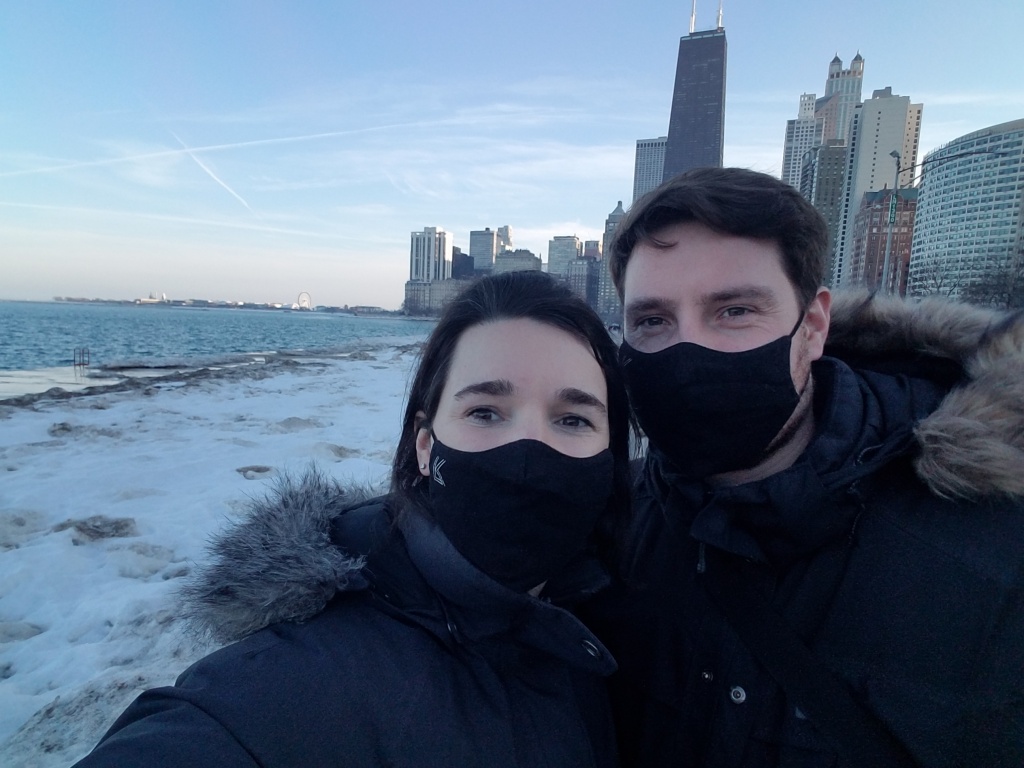
Laurène with her husband in Chicago in 2020 ( photo: courtesy of Laurène)
Other interviews of "Ad astra: dreams and reality of aerospace engineering" series:
Interview with Jean-Christophe Boulon (Me 213)
Interview with Corentin Lazarus (Me 209)
- Details
On April 8th first spring online gadz apero was organized. Sacha Ghebali, our East Coast president, launched this initiative and it was supported by other groups members. 17 Arts et Metiers alumni and students from California, New-York participated in this nice online gathering. Xavier Wartelle, AFAM CEO, talked about AFAM, its activities and successes.
Online aperos are a unique moment for gadzarts across the US to share, talk and network.
To know about our future aperos and events, please sign up for our monthly newsletter and join a gadz group in your region!
See you at our next gathering!
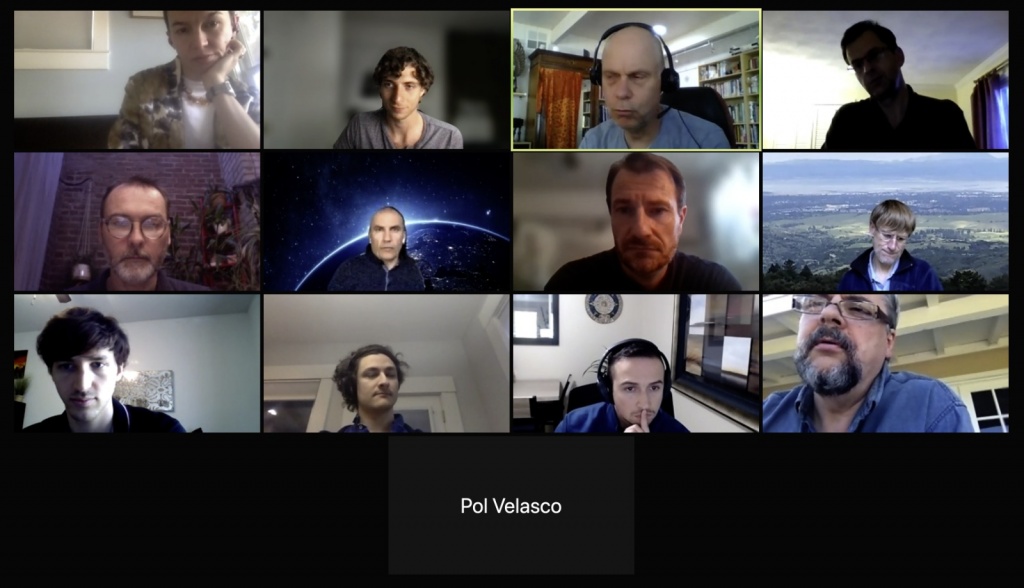
- Details
Traditionally, aerospace industry interests a lot of Arts et Metiers students. To know more about gadz working in the aerospace sector in the US, we decided to launch “Ad astra: dreams and reality of aerospace engineering”.
Our first interview in this series is with Jean-Christophe Boulon (Me 213)
AFAM: Hello, Jean-Christophe, and thank you for this interview. Your Linkedin profile says that you are in charge of Special projects at Safran Cabin in California.
Please could you tell us more about your job? What do you do every day at work?
Jean-Christophe: Hello and thanks for having me!
The nature of my job is to deliver projects for the VP of Engineering. Our company scaled up from Zodiac Aerospace to Safran, so there are many areas where processes and tools are missing. Lately, I built a tool that lets you track automatically the cost of a physical product directly from the 3D model. The tool merges different cost databases and renders it visually, for the engineers to the CEO.
Because we built a department around it, every day I work I try to build metrics to manage the work inflow and processes.
These days, I spend 20% of my time in meetings to follow the different running programs. Another 20% is spent on responding to emails (people needing training or support).
.
AFAM: How did you start your career in aerospace engineering? Tell us about your starting point.
Jean-Christophe: In 2017 I was doing research for the Department of Energy in Chicago. My visa time was up, and I found a VIE opportunity at Safran in California. At first the tasks were broad, and then I focused on process engineering and delivering high-value projects. I was lucky enough to work under a very dynamic boss who likes to innovate, and trusts his employees.
I think that if you like to bring value and you find this type of boss, it will go a long way to bringing you work satisfaction.
AFAM: What are the challenges of your job? What do you like most about your job?
Jean-Christophe: Creating a department means building something new, so I cannot benefit from proper mentorship. I also have to fight for resources. Lastly, like most big companies, there is sometimes a lot of work needed to gather trivial information. So proper networking within the company is paramount.
Overall, it's very intense. But as long as I deliver, I can direct my work independently, which gives a great sense of ownership.
AFAM: is there anything you’d like to say about the aerospace industry today: any challenges the industry faces, what are the best professional opportunities today in aerospace you can see and tell us about?
Jean-Christophe: The aerospace industry is diverse : some sectors are very dynamic ( urban mobility, defense..). The aeronautical sector is going through a slower pace, but business is still there.
There are opportunities everywhere: in smaller and newer companies to build the next best technology (A3, Boom, KittyHawk, Joby..), or in major companies to be part of something global (Boeing, Airbus, Safran..). There is a need for digitalization in most of these companies, and a can-do attitude will bring you a long way, no matter what you do. If you bring value and make your job better, success will come naturally.
AFAM: How being a gadzarts helped you in your career?
Jean-Christophe: I got my first internship at Safran Landing Systems thanks to the alumni phone book. I called a director, and he helped me right away.
In my last year at school, I was lucky enough to go study in Brazil with the school, and speaking Portuguese today is a valuable asset. Lastly, I know I can always count on the mentorship of elder gadzarts, while I try to help younger ones. We're the professional equivalent of Elton John's circle of life.
AFAM: Any pieces of advice for our students willing to start their careers in the aerospace industry and for those who are looking for internships?
Jean-Christophe:
Quality over quantity. Focus on a couple of companies, identify roles you are suited for, and try to reach out to connections in this company. There is a lot of competition in the US, never be afraid to reach out. Be organized and courageous, as it could be a lengthy process. But immensely rewarding.
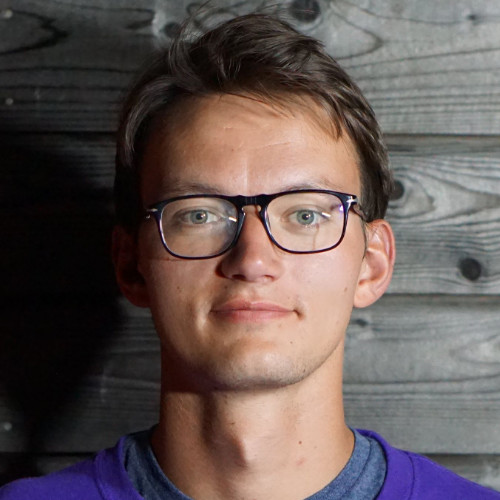
Photo: courtesy of Jean-Christophe Boulon
Other interviews of "Ad astra: dreams and reality of aerospace engineering" series:
Interview with Laurène Rokvam (Bo 210)
Interview with Corentin Lazarus (Me 209)
- Details
Online meetings with Arts et Metiers students became a good tradition in these unprecedented times. On March 26th Arts et Metiers students met our alumni Nicolas Horde, Corentin Lazarus, Bastien Raimbault and AFAM community manager Albina Patou-Chebykina to ask questions about AFAM, Shasta and Georgia Tech where some students would like to study next year.
During this 1-hour meeting our alumni could talk about their experience in the United States encouraging students to apply to Georgia Tech or to look for an internship in the US.
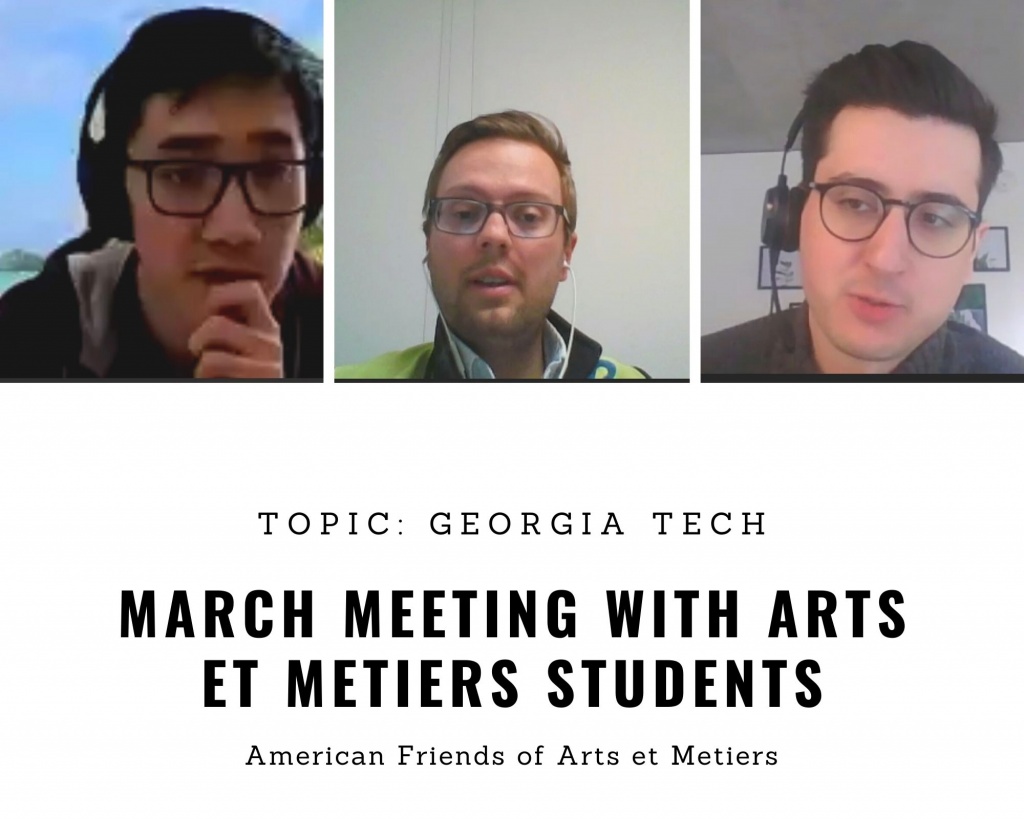
- Details
We decided to launch this new series as service sector is the one who suffered the most during the COVID-19 crisis. But at the same time while some doors are closed and some companies sink into pandemic bankruptcy, the service sector shows its flexibility and high creativity by opening new doors and looking for fresh opportunities for growth and development.
Our first interview in this new series is with Damien Blanc ( Ai 208), project engineer at homemuse.io
AFAM: Hello Damien. You are a project engineer at a new online platform homemuse.io
Please tell us more about your company and your job.
Damien: Homemuse.io is a brand new online platform that offers a wide selection of professional music teachers for more than 18 different instruments, for at-home or online lessons. The idea was to create a platform where students could focus on their music training and leave the administrative tasks to us. Everything is integrated on the website: zoom interface, schedule, payment 100% secured, dashboard to track progress and exchange with your teacher. So far, we’ve got 100% positive feedback from both our customers and the teachers.
To keep our students motivated, we also organize on a monthly basis, online masterclasses hosting one our teacher, accessible from all around the world for everyone, musicians or not.
On a daily basis as a project engineer I deal with several subject which are completely new to me:
- Growth strategy;
- SEO (the practice of increasing the quantity and quality of traffic to a website) which is the key to success for an online platform;
- Marketing: advertisement, making offers, social media's strategy, etc)
- Client relationship (managing request, quotes, feedback, technical issues, etc);
- Managing teachers (recruitment, assistance, masterclass organization, etc).
AFAM: You have been working for Total in Africa and South America for 7 years. How come you decided to work for homemuse.io after all these years at Total?
Damien: I was a field drilling/completion engineer for 7 years in Total which offered me the opportunity to discover the world and work on some nice international projects : development of shale gas in Argentina for 3 years, exploration wells in the Sahara desert for 2 years, several inspection or technical missions in Denmark, Bolivia, Scotland.
Field engineers have to work on site, which are usually remote, far from any civilization (on deserts or offshore), which makes life a bit hard sometimes not to mention the 4 weeks on/4 weeks off rotation system which seems nice on paper but doesn’t allow to have a very stable life.
With Covid-19, the work conditions, which were already not ideal, started to worsen. Companies try sometimes to take advantage of a crisis to reduce benefits, career advancement and I eventually felt under-used. In this kind of big industry it’s hard to make a change and the inertia of decision-making started to wear myself out. I felt that it was time for me to move on to something more exciting.
Example of a drilling site in Sahara desert (photo: courtesy of Damien)
AFAM: What do you like the most in your job for homemuse.io?
Damien: This job is a real breath of fresh air, I had never worked before in a start-up environment (we are a small team of 3), and it is so fulfilling and exciting. What amazes me the most is that you can almost immediately see the effect of your work and its impact on your business. That is what missed me the most in my previous job where the inertia of big companies have the tendency to kill initiative and motivation. I learn so many new skills everyday, you need to multitask and react fast. I think the Arts et Métiers have taught me well to be multifaceted and adaptable.
AFAM: What do you think about the future of services and online platforms like homemuse.io in the aftermath of covid-19?
Damien : At first the idea was to connect students to music teachers locally.
But with COVID-19 the business was jeopardized. It gave us the opportunity to innovate and come with a complete integrated online solution where you can enjoy your music lesson in the comfort of your home. Now, most of our clients go for online lessons with their teachers and so far all our students are really satisfied with the solution we put in place. At the end of the day, COVID has been a great opportunity for us: there are no problems, only solutions.
AFAM: How did Arts et Métiers prepare you for your current work? How does being a Gadz’Arts help you in your everyday tasks at work?
Damien: Arts et Métiers is definitely the school where you can learn how to manage a project.
The disciplines taught are so different that it opens your mind and really gives you the capacity to handle any kind of technical subject. It widens the boundaries of your comfort zone. It becomes wider and it gives you the opportunity to think “out of the box”.
The good thing with Gadz’Arts network is that you can always find someone working in the same area and rely on their expertise to get the good tips, it helps a lot!
AFAM: Thank you, Damien for you time, this interesting conversation!
Damien: I’d like to add that we offer a special discount of 30% off on the first music lesson to AFAM blog readers by using the code GADZ21 on our website (homemuse.io/teachers)
AFAM: thank you for this special offer ! We hope that gadzarts living in the US, members of our community, will enjoy it.
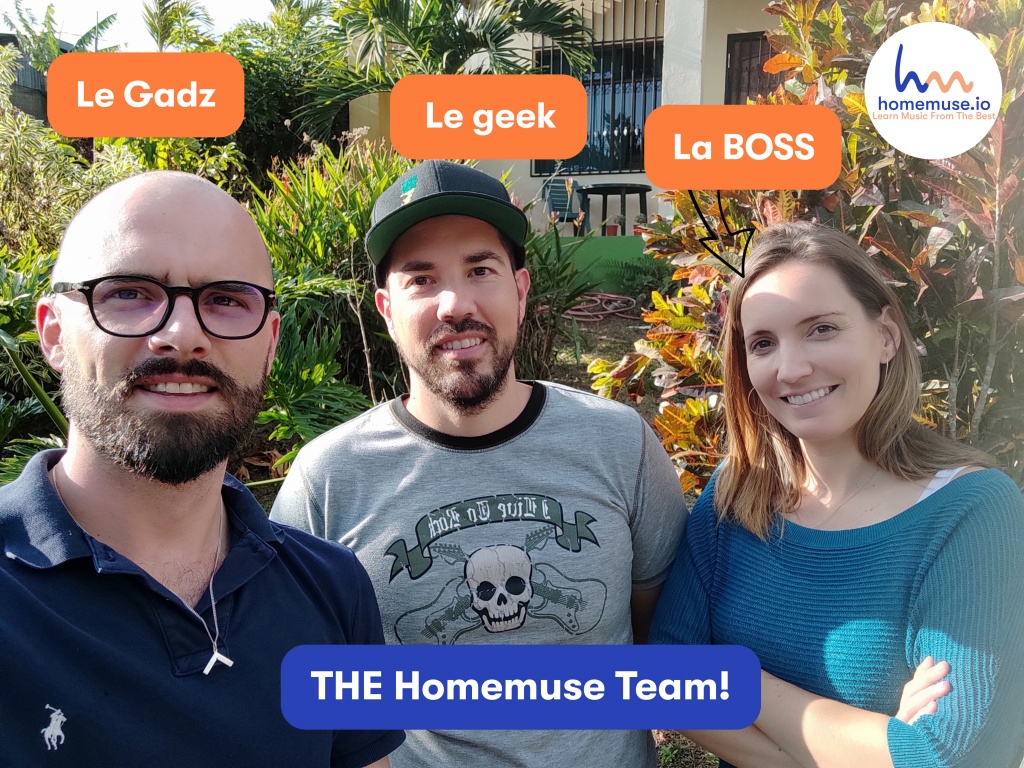
- “Why remote internships could be a real opportunity” - with Xavier Wartelle, Co-founder and CEO of Avatar Medical, Founding partner at big bang factory and AFAM CEO
- AFAM participation in International Week organized by Lille BREI
- Shasta success story: Sébastien Sequeira (Bo 216) - intern at Tesla
- 2020 in review
- New Délégué Général (DG) Amériques

 BLOG /
BLOG /  CALENDAR /
CALENDAR /  DONATIONS /
DONATIONS /  MENTORS /
MENTORS /